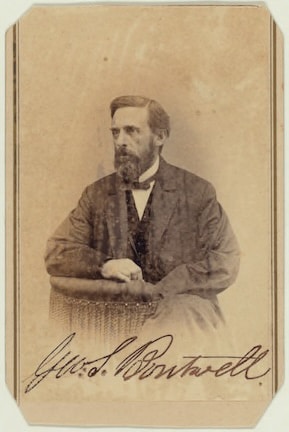“The Usurpation” of Andrew Johnson

In preparing for an upcoming podcast interview with author Jeffrey Boutwell, I came across a fascinating piece written by Boutwell’s ancestor, George Boutwell, that appeared in The Atlantic Monthly in October 1866. It was titled “The Usurpation,” a 10-page essay that you can read for yourself for free at the Internet Archive.
At the time, George was serving in the U.S. House of Representatives from Massachusetts. In that position, he would eventually be one of the key House figures to lead the impeachment case against President Andrew Johnson.
That effort would not begin until February 1868. However, even by the fall of 1866, Johnson’s behavior was jarring enough to political opponents that some of them—George Boutwell included—began to lay out a case against Johnson.
“There are three passions to which public men are especially exposed, — fear, hatred, and ambition,” Boutwell began. “Mr. Johnson is the victim and slave of all; and, unhappily for himself, and unfortunately for the country, there is no ground for hope that he will ever free himself from their malign influence.”
Boutwell argued that Johnson’s flawed character left him open to manipulation by former Confederates, and together, they attempted to usurp the Federal government to their own ends. “Shall the Union be restored by usurpation, — by a policy dictated by the Rebels, and fraught with all the evils of civil war?” Boutwell asks, although his essay laid out a clear answer for his readers.
It’s an interesting argument with modern resonances that definitely make it a worthwhile read.
My interview with Jeffrey Boutwell about his influential ancestor will be coming up later in September.

This is an obscure and under reviewed topic of the war and of the Johnson Presidency. I’m delighted ECW is bringing this “tasty dish” to the fore for those of us CW nerds to feast upon.
Chris, Thanks for bringing this article to the attention of the ECW community – my biography of George (BOUTWELL: Radical Republican and Champion of Democracy, WW Norton, 2025) points out that his article in the Atlantic in October 1866 was the opening salvo in the impeachment campaign against Andrew Johnson for seeking to “usurp” the powers of Congress and undermine Reconstruction protections of equal rights in the South. I’ll be discussing the book, George, and the impeachment of Johnson at the upcoming Mississippi Book Festival on Saturday, Sept. 13, as part of a panel on the Civil War and Reconstruction, on the grounds of the Old State Capitol in Jackson. Any ECW members in the area are urged to come!
An interesting and venomous time. Lincoln’s political skills and the military successes (at last!) of his generals had managed to suppress effective opposition either from Congress or the government’s in rebellion. His death unhinged it all, though his prospectively lenient policies regarding the reintegration of those states in rebellion back into full communion intimated of future troubles. His reelection in 1864 had brought into Congress through elections from June 1864 to late 1865 many representatives hardly sympathetic with Lincoln’s apparent goals. Many of those elected took the seceded states at their own word, held they had rejected or broken the national compact, and could be refashioned at the Congresses will. They deemed that Congress held primacy in these matters as Congress had long had power over the admission of the territories. In this, Lincoln would have strenuously disagreed., but infinitely more adroitly than his successor. Johnson suffers greatly in comparison to Lincoln, principally because of the overt and odious nature of his racial animus. But on constitutional grounds, I really don’t see significant divergence from Lincoln’s position expressed before his death. I hardly see Lincoln embracing the fringe of his party that he fought so consistently against in the war years, especially as regards the ambitions of Chase. However, I doubt the die hards down south would have had the nerve to test him so early or so consistently as they did Johnson.